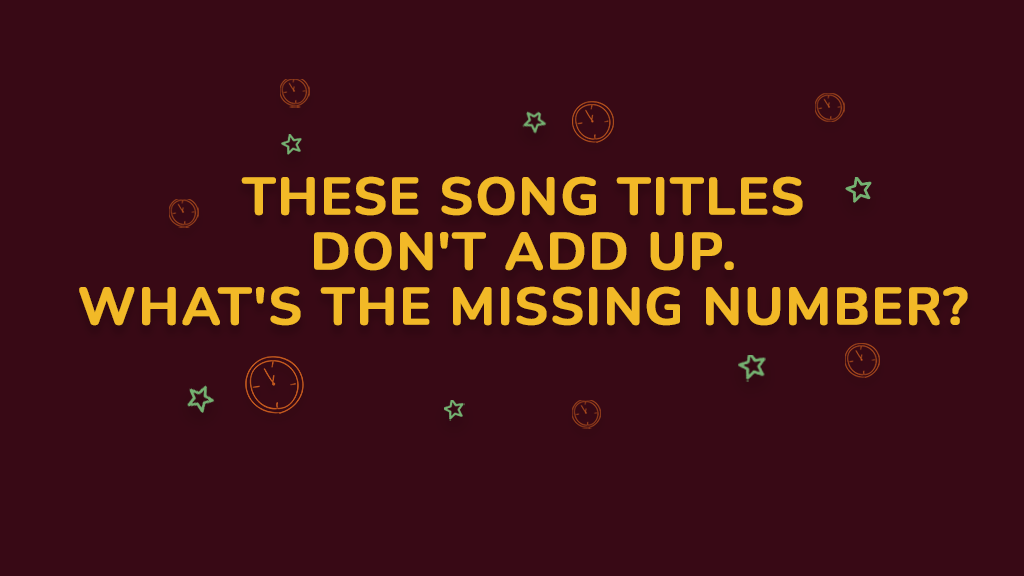❤️It's Trivia, but Sweeter❤️
These Song Titles Don’t Add Up. What’s the Missing Number?

Song titles with numbers have a unique charm in the music industry. Numbers often provide structure and rhythm that add depth to lyrics and catchy melodies. Whether it’s a specific number of items, a time period, or even an abstract concept like age, numbers in song titles help create a distinct identity and often generate curiosity among listeners. They allow music lovers to relate to the song in different ways, sparking memories of certain times, feelings, or experiences that the number represents.
Over the years, musicians have used numbers in a variety of ways. For example, many songs incorporate numbers that are symbolic or part of a larger narrative. These numbers can range from those that represent age, a date, or even a sequence of actions or events. The incorporation of numbers in song titles can create a sense of rhythm or repetition, which is not only effective in music but also becomes a fun challenge for those who enjoy trivia related to songs.
One of the most notable ways numbers appear in song titles is through lists or counting. Many songs feature a specific number as a key part of the song’s theme. Take, for example, “One, Two, Three, Four, Five, Six, Seven, Eight, Nine, Ten” — a playful and rhythmic approach to counting that is instantly recognizable. It’s a simple counting exercise that resonates with listeners because counting is a universal experience. The idea of something being counted or a sequence that builds toward a final number can evoke feelings of anticipation or even nostalgia, especially when paired with a catchy tune.
The use of numbers in song titles often extends beyond counting to convey emotional or symbolic meaning. For instance, the song “99 Problems” by Jay-Z takes the concept of problems and exaggerates the number to emphasize the overwhelming nature of life’s challenges. The phrase “99 problems” has become iconic in its own right, symbolizing frustration, adversity, and personal struggle, all of which are relatable themes in the world of hip hop and beyond.
In contrast, a title like “100 Years” by Five for Fighting delves into the theme of time, illustrating how fleeting life can feel as one counts the years. The inclusion of “100” conveys a sense of finality or a milestone, with the number serving as both a literal and metaphorical measure of the passage of time. In this case, the number acts as a poignant reminder of the brevity of life, making the song more meaningful and resonant with listeners who are reflecting on their own experiences.
Music is a reflection of the times, and sometimes numbers in song titles can help us remember specific events or trends. “99 Red Balloons” by Nena, for example, is a German song that gained popularity worldwide. Its title, referring to “99 red balloons,” becomes symbolic of the song’s anti-war message. The number “99” is arbitrary but serves as a catchy hook, while the image of balloons floating into the sky gives the song its sense of wistfulness and poignancy. The inclusion of the number gives the song a sense of scale, making it feel both epic and personal.
There is also an undeniable impact that numbers have in terms of creating a sense of rhythm and structure in a song. Think of “Eight Days a Week” by The Beatles. The number “eight” might not sound like a typical measurement of time, but its inclusion in the title gives the song a playful energy and structure that fits the overall feel of the music. The repetition of “eight” plays on the listener’s expectations, making it catchy and easy to remember. This is a common trait in pop music, where numbers often serve as tools to make songs more singable, memorable, and accessible to a broad audience.
Similarly, “One is the Loneliest Number” by Three Dog Night uses the number “one” as a metaphor for loneliness and isolation. The title is simple, yet it evokes a powerful emotional response. The number one in this context is not just a number but represents the feeling of being alone, something many people can relate to. By using numbers in this symbolic way, the song captures the essence of loneliness in a way that resonates deeply with its audience.
The use of numbers can also provide a sense of humor or irony. A song like “99 Luftballons,” also by Nena, plays with the number 99, using it as part of an anti-war protest song. The song contrasts the innocence of balloons with the chaos of war, and the number 99 serves as an anchor to this juxtaposition. By using such a high number, the song becomes more memorable and catchy, reinforcing the central message through repetition.
In popular music, the presence of numbers can also contribute to a song’s success. Songs like “One, Two, Three” by Gloria Estefan or “99 Red Balloons” by Nena gained recognition and commercial success in part because of their simple yet compelling use of numbers. Numbers can make a song more approachable, as they provide a mental structure for the audience to latch onto. When paired with an infectious melody, a number in the title can become a hook that sticks in the listener’s mind.
Interestingly, numbers in song titles are not only used for their meaning but also for their ability to create a sense of continuity in the music industry. Many artists repeat numbers in their music, giving rise to songs that have sequels or follow-ups, sometimes incorporating the same number. This creates a kind of narrative thread that listeners can follow, enhancing their experience and connection to the music.
At the same time, the use of numbers in song titles also serves to highlight the importance of storytelling in music. The number in the title often sets the stage for a larger narrative. Whether it’s a song about time, love, personal challenges, or reflections on life, the number provides a point of reference that helps tell the story. The number acts as both a literal and symbolic tool, offering a framework for the song’s message.
Ultimately, numbers in song titles offer more than just an easy way to catch a listener’s attention. They help structure the song, convey emotions, and add layers of meaning. Whether the number signifies an age, a time period, or a quantity, it’s a tool that allows songwriters and artists to communicate with their audience in a way that is simple, yet deeply resonant. As you explore the vast number of songs with numbers in their titles, you begin to see how versatile this literary device can be in shaping a song’s impact and meaning.
The continued use of numbers in music highlights a key characteristic of the medium: its universal appeal. Numbers transcend language, culture, and time. From one to a hundred, numbers are universally understood, and they remain a fun and effective way for songwriters to express feelings, tell stories, and connect with their audience. Whether it’s a song about love, time, or life’s challenges, the power of numbers in music continues to resonate with listeners around the world.



